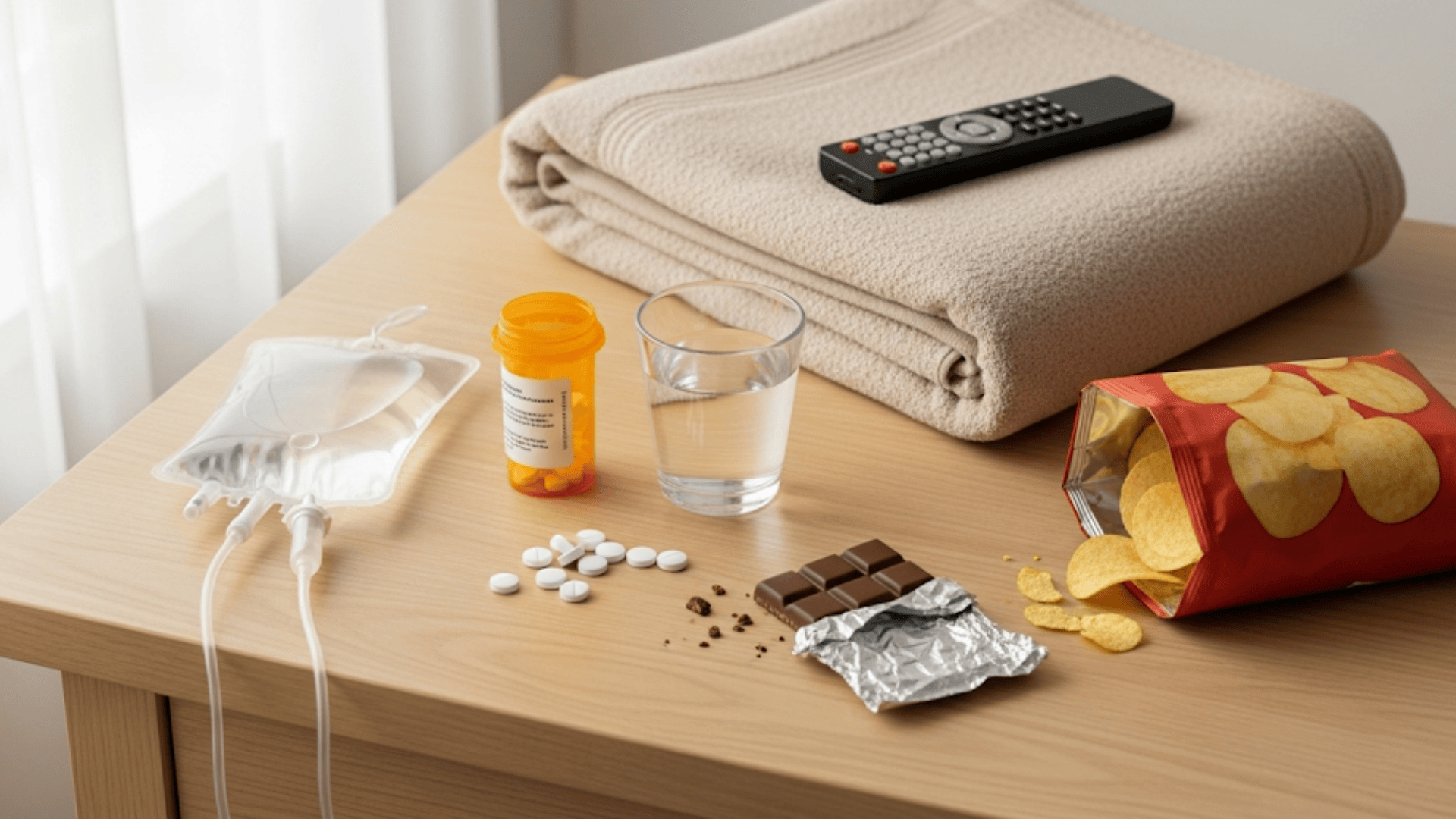Stepped on the scale after surgery and felt your heart sink? You’re not alone.
That number staring back at you might feel like a personal failure, but here’s something most doctors don’t tell you upfront: post-surgery weight gain happens to nearly everyone.
What if you could understand exactly why your body is holding onto those extra pounds and learn simple ways to get back on track?
From fluid retention to medication side effects, there are real reasons behind that weight gain and practical solutions that actually work.
Let’s break down what’s really happening in your body after surgery and give you the tools to feel confident about your recovery again.
Is Post-Surgery Weight Gain Normal?
Seeing the scale tip up after surgery can be unsettling, but most of the time, it’s totally normal.
Gaining 0.4 to 7 pounds from fluid retention is super common and usually fades within a few weeks as your body heals.
Your kidneys start flushing out extra fluid, and the puffiness goes down.
However, if the weight sticks around for months or comes with severe swelling, pain, or other weird symptoms like barely peeing, it could point to something more serious, like lymphedema or an infection.
Don’t brush it off; reach out to your doctor to make sure everything’s okay.
Common Causes of Weight Gain After Surgery

Your body’s been through a lot with surgery, and it’s no wonder it reacts in ways that add a few pounds. Here are the main culprits:
-
Fluid Retention (Edema): Surgery can cause tiny injuries, prompting your body to retain fluid to facilitate healing. IV fluids during surgery add to this, and for some, like cancer patients with lymph node removal, fluid buildup (lymphedema) can linger.
-
Reduced Activity: Recovery means less moving around, which burns fewer calories. This can lead to weight gain, especially if you’re eating as you did before.
-
Medications: Drugs like corticosteroids or pain meds can make you bloated, hungrier, or constipated, nudging the scale up.
-
Emotional Eating: Stress or boredom during recovery can lead to snacking on comfort foods like chips or sweets.
-
Hormonal Shifts: Stress hormones like cortisol or ADH (antidiuretic hormone) make your body cling to water or store fat temporarily.
How Different Surgeries Affect Weight Gain
Different surgeries can affect your weight in unique ways. Here’s a quick look at how some common procedures play a role:
|
Surgery Type |
How It Causes Weight Gain |
Typical Gain |
|---|---|---|
|
Bariatric Surgery |
Fluid retention right after; long-term regain (10–30% of lost weight) if eating habits slip. |
0.4–7 kg (short-term) |
|
Orthopedic Surgery |
Less movement leads to fat gain and muscle loss. |
Varies, often 1–5 kg |
|
C-Section |
Hormonal changes and fluid retention; 70% higher risk of post-pregnancy weight gain. |
1–5 kg (post-pregnancy) |
|
Thyroid Surgery |
Minimal gain, similar to non-surgical thyroid patients. |
0.94–1.07 kg (1–2 years) |
|
Cardiac Surgery |
Fluid overload from IVs or recovery protocols. |
0.4–1 kg (short-term) |
Long-Term Effects of Post-Surgery Weight Gain
If weight gain persists, it can impact your health over time.
Extra pounds, especially from fat gain, can raise your risk for things like high blood pressure, diabetes, or joint pain, especially after surgeries like knee replacements, where extra weight stresses the joints.
For bariatric patients, regaining weight can undo some of the benefits of surgery, such as improved blood sugar control or reduced strain on the heart.
The good news? Getting ahead of the curve with diet and exercise can make a significant difference.
Studies show that consistent lifestyle changes, such as eating high-protein meals and staying active, can help minimize long-term weight gain.
How to Prevent and Manage Weight Gain After Surgery?
Nobody wants extra pounds hanging around. Here’s how to keep them in check:
-
Eat Smart: Focus on lean proteins (such as chicken and fish), vegetables (like spinach and cauliflower), and whole grains. Drink 64 ounces of water daily to flush out fluid and curb hunger. Skip sugary sodas or snacks.
-
Move When You Can: Start with light walks or stretches once your doctor gives the okay. It boosts your metabolism and helps keep your muscles strong. Bariatric patients should aim for 150 minutes of exercise a week.
-
Check your meds: If your medications are causing weight gain, talk to your doctor. They might adjust your dose or prescribe a medication to help with fluid buildup.
-
Tame Emotional Eating: Feeling down? Keep a food journal to spot triggers or talk to a counselor. Support groups can also be a lifesaver.
-
Bariatric-Specific Tips: Eat 80–100 grams of protein daily in small, frequent meals. If weight creeps back, consider discussing medications like semaglutide or procedures to tighten your stomach pouch.
Lifestyle Changes to Support Recovery and Weight Management
Beyond diet and exercise, your daily habits can help you bounce back without extra weight.
Get enough sleep, 7 to 8 hours a night, since a lack of rest can disrupt hunger hormones and lead to cravings for junk food.
Stay hydrated to help your body flush out excess fluid and reduce bloating.
Try stress-busters like deep breathing or meditation to keep emotional eating at bay.
If you’re recovering from a major surgery, such as bariatric or cardiac surgery, consider working with a dietitian or physical therapist to create a personalized plan that meets your specific needs.
Small changes, like swapping soda for water or taking a 10-minute walk, add up over time.
When to Consult a Doctor
Most weight gain after surgery is no cause for alarm and fades as you recover. But there are times when you should pick up the phone and call your doctor. Here’s when to act:
-
Rapid Weight Gain: Gaining a significant amount of weight in a short period (e.g., 5+ pounds in a few days) may indicate fluid overload or another underlying issue.
-
Severe Swelling: If your legs, arms, or other areas are extremely swollen and don’t improve, it may be lymphedema or another condition.
-
Other Red Flags: Symptoms like reduced urine output, shortness of breath, or pain could point to complications like infection or fluid buildup.
-
Persistent Weight Gain: If the extra pounds don’t budge after a month or two, it’s worth a check-in to rule out hormonal or dietary issues.
A quick telehealth visit or follow-up with your surgeon can give you clarity and peace of mind. Don’t hesitate to reach out if something feels off.
Wrapping Up
Post-surgery weight gain doesn’t have to define your recovery story. Your body is simply doing what it knows best – healing and protecting itself through temporary fluid retention and metabolic changes.
The key takeaway? Most weight gain after surgery is short-term and manageable. Focus on gentle movement when cleared by your doctor, eat protein-rich foods, stay hydrated, and be patient with your body’s natural healing process.
Remember, persistent weight gain lasting months or severe swelling needs medical attention. Don’t ignore warning signs like rapid gains or breathing difficulties.
Ready to support your recovery? Start with one small change today – whether it’s a short walk or swapping that sugary drink for water. Your future self will thank you for taking control now.









